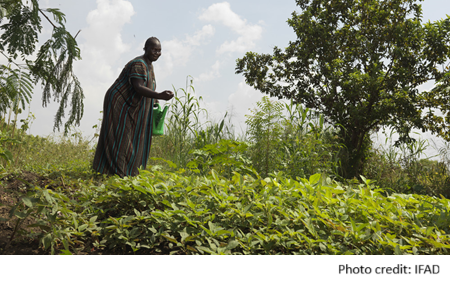The Paris-based Organization for Economic Co-operation and Development (OECD) is urging the Canadian government to increase spending on international assistance. In a recent report which was the subject of an article in the Globe and Mail, the OECD says Canada should, "...increase foreign aid flows in line with its renewed engagement." The chair of the committee that prepared the report adds, "It is important now to set out a path to increase weight to Canada's global advocacy role". In other words, like many civil society organizations in Canada, they are saying that it is time we "walk the talk" when it comes to investing in international assistance. Click here to read the full Globe and Mail article.
The Bigger than our Borders campaign , https://www.biggerthanourborders.ca/ which GRAN has recently joined, is building a movement of Canadian supporters to encourage our government to increase its spending on Canadian aid.
“I’m living testimony that you can be clear.” One Woman’s TB Survival Story
Tuberculosis: The Curable Disease on the Rise and How to Tackle It
Money Doesn’t Matter? It Does When It Comes to Ending Tuberculosis
These are the titles in a recent series of articles published in the Guardian newspaper by the STOP TB Partnership. The articles clearly lay out the scope of the emergency, put a human face on the crisis, and outline the steps and commitments necessary to end TB. Click here to read each instalment of this informative and compelling series. And please share the link with family and friends to help raise awareness of this worldwide health emergency that so many Canadians mistakenly think of as a thing of the past.
Many Canadians believe tuberculosis (TB) to be a disease of the past, when in fact it has now surpassed HIV/AIDS and malaria as the world's deadliest infectious disease, killing over 1.7 million people each year.
And Canada is not immune. Rates of TB infection among the Inuit people of Canada are among the highest anywhere in the world.
What can Canada do at home and abroad to address this urgent global health crisis? Read more here in an article by Dr. Madhukar Pai, Director of the McGill International TB Centre.
UNAIDS warns that progress is slowing and time is running out to reach the 2020 HIV targets. Its just-released report, Miles to Go: Closing Gaps, Breaking Barriers, Righting Injustices, is a stark wake-up call. “We are sounding the alarm,” said Michel Sidibé, Executive Director of UNAIDS. “Entire regions are falling behind, the huge gains we made for children are not being sustained, women are still most affected, resources are still not matching political commitments and key populations continue to be ignored. All these elements are halting progress and urgently need to be addressed head-on.”
To read more, including a link to the full report, click here.
Absent in statistics, unnoticed by researchers, neglected by national and local authorities and mostly overlooked by civil society organizations – the situation of many widows around the world is both desperate and invisible. Millions of the world’s widows endure extreme poverty, ostracism, violence, homelessness, ill health and discrimination in law and custom. The United Nations has stated that the abuse of widows and their children constitutes one of the most serious violations of human rights and obstacles to development today. To raise awareness and provide opportunities for action towards achieving full rights and recognition for widows, the UN has established June 23rd as International Widows’ Day. Read more by clicking here.
Dr. Ghazy Mujahid of the Ontario Society of Senior Citizens Organizations (OSSCO) has initiated an E-Petition to urge our government to recognize and safeguard the interests of Canadian seniors by appointing a Minister or Special Advisor to the Prime Minister for Senior Affairs. This petition is sponsored by MP for Mississauga-Erin Mills, Iqra Khalid, and is open for signatures until July 4.
Read more here in a National Post "Grey Matters" article by Wanda Morris, CARP VP of Advocacy, making the case for having a voice for seniors in government.
To read the full text of E-petition 1566 on the House of Commons website click here.
Prime Minister Trudeau has announced that Canada will champion girls' education in crisis situations at the G7 Summit in June – backed by a significant financial investment. This is great news!
Read more about the critical importance of education for girls in crises at http://educateallgirls.ca/
A new HelpAge International report Freedom to Decide for Ourselves brings together the findings from a consultation with 450 older people in 24 countries to find out their perspective on their rights to autonomy and independence, long-term care and palliative care that are central to human dignity. Click here to access further information and download the report "Freedom to Decide for Ourselves". Click here to read why these rights should be in a Convention on Older People's Rights.
Tuberculosis is a communicable disease with high incidence rates in many sub-Saharan countries. Although curable, it kills more people than any other infectious disease. TB often co-habits with HIV, causing treatment challenges. In Canada, the highest rates occur in Indigenous populations and in foreign-born Canadians. A high-level meeting is planned at the United Nations General Assembly in September 2018 to consider problems related to diagnosis, treatment and drug resistance. March 24th, World TB Day, is an occasion to raise awareness for the need to achieve a TB-free world. Read more about TB and opportunities for raising awareness from Results Canada's website.
Good news! Canada will double its pledge to the Global Partnership for Education to $180 million over the next three years (2018-2020). Prime Minister Trudeau announced Canada’s pledge at the World Economic Forum in Davos this week. This renewed commitment represents an increase in Canada’s giving from $30 million a year to $60 million a year.
As you know, GRAN, along with members of the Canadian International Education Policy Working Group (CIEPWG) and other Canadian civil society organizations, has been calling on the Canadian government to increase its political and financial commitments to girls’ education. Our voices were heard, despite the announced commitment falling short of the $260 million Canadian CSO’s and the GPE had been asking for.
We are encouraged by this pledge, knowing that Canada recognizes the importance of education in achieving gender equality and the full empowerment of girls and women. However, education in development still only receives 8% of Canadian Official Development Assistance (ODA), falling short of the 15% that global advocates are asking donor countries to give. We look forward to more bilateral and humanitarian announcements to support global education in the upcoming year.
Many Canadians became engaged in education issues in the past year. Along with our partners in the CIEPWG, thousands of actions were taken to bring forward the need to support education. GRAN members were a significant part of actions taken and we thank you all for your commitment and continued efforts.
This is an exciting time for improving the human rights of girls and women of all ages. An important step forward in the fight for gender equality was taken this week. The journey continues. The road of advocacy is not easy, but we can celebrate that we have been a part of making change and breaking down barriers so that many girls and women in sub-Saharan Africa will be better able to claim their rights and lift themselves out of poverty.
You can read the Prime Minister's full news release by clicking here.
Pages


